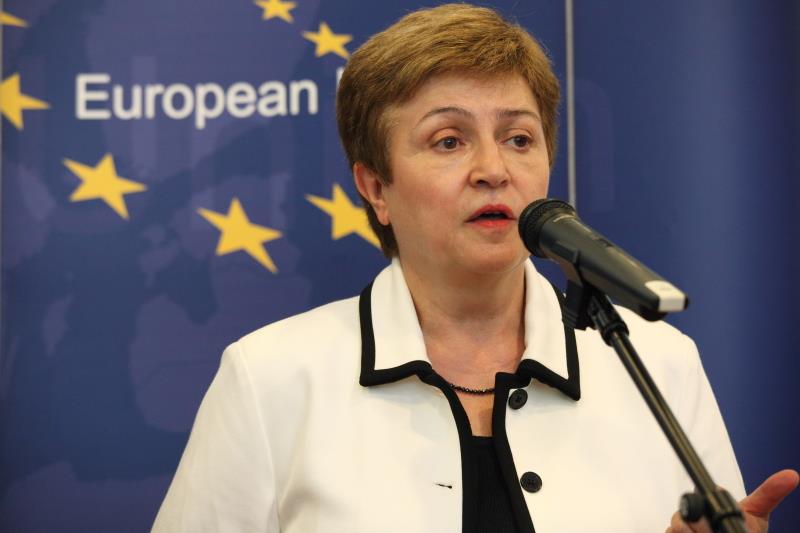Speaking at a press conference in the EU House in Sarajevo, Commissioner Georgieva said:
“Good afternoon and thank you all very much for coming.
I will start off with what I said upon my arrival here and it is a message of very deep sympathy to the communities, the families that have been affected, who lost members of their families and friends, who lost their houses, who lost their livelihoods. I had a chance to see for myself how devastating these floods are and it is heart-breaking. Three days after the rain stopped, villages are still under water and people are still unable to go home, even if they are in areas where the impact of the floods is not as profound as it is where they are still 2 to 3 metres under water.
From the very first day when BiH called on the EU for help we have sent teams with helicopters, boats, pumping stations, water purification units, beds, mattresses, items for people who are affected by the floods. And we actually sent more than BiH asked for because it became very clear that this is an extraordinary disaster. 16 of the EU member states have sent teams – and today there are more than 150 rescue workers in the most difficult places fighting the floods.
We are now coming out of the lifesaving phase although even today in one place there was rising water in the house, and a boat went to go and save a family, 4 adults and a child, but that is now not any more the most pressing issue.
Over the next days and weeks we will focus on first continuing to pump the water out from the areas that are still flooded, with high volume pumps. This also includes fixing a broken wall of the dam up north on the Sava River by dropping from helicopters big cement blocks so we can prevent further flooding. Second, we will look for delivering more small pumps when the open water drops down to pump the residual water from buildings so that they can then dry out.
But we also are starting the second humanitarian phase: assisting the affected population. The most troubling problem today is the large number of animals in the water, dead animals in the water, and the mixing of water supplies with polluted water creating very serious health risks for populations in these areas.
We will increase the delivery of water purification units, water purification tablets, but also it may be necessary to do the spraying of the areas, because high temperatures also mean a lot of mosquitos and dangerous mosquito-transmitted diseases. And then we need driers for the buildings that have been flooded, we need generators where there is no electricity, we need clean water, mattresses, blankets for people that are evacuated. We will be funding the Red Cross/Red Crescent to do some of this.
We fully recognize that the impact of the floods in Bosnia and Herzegovina is made even more difficult to fight because of the impact of the war 20 years ago.
First, because there are mines now dislodged by the floods and the moving of land – landslides – as well as other explosive devices and they make recovery operations more dangerous and more difficult. And second, because many of the people who are now displaced are the same people that were displaced by the war. They rebuilt their lives and they are now pushed by the force of nature into a tragedy again. I met some of them in Orasje and people there – they are strong. They learned how to deal with tragedy during the war. But this is so terrible, they cannot cope on their own, they need help.
And I want to finish now with what I said to the director of the school – Niste sami! (You are not alone!).”
Q: You listed the priorities. When will the EU actually take concrete steps, such as spraying, purifying tablets. When can we expect that?
A: “The action of purification is going on. We have delivered through the system of civil protection of the European Union a number of water purifying stations and I saw one of them operation in Obrinjin. We will come back to the questions about the spraying. We will consult EU member states and see who may be able to do it but that needs to happen within a week if we want to be effective and to prevent the spreading of the diseases. That will be a priority for me for the next days. It is a problem that became obvious only, virtually, yesterday and today due to the high temperatures.”
Q: When do you expect the EU assessment teams to come and assess the damage?
A: “We already have assessment teams here. We have experts that are looking into assessing the most-needed humanitarian needs right now. What we need to do to help people now – we are already assessing and we are already acting on it and funding. And then we will bring experts within a World Bank team to do a very serious damage assessment to serve as a foundation to move to the third phase, which is recovery and reconstruction. We have a coordination team, assessment team here since of 18th May. They work together with Ministries of Interior, the civil protection teams, together and we also have teams in all the most affected areas to coordinate the European assistance. As for the damage assessments, four people will be coming to join the World Bank team within days. They may be already on their way. I just want to say, in the Balkans, we are very strong people, and I assure you we know this. This is very difficult, and that’s why we will be together – solidarity!”




